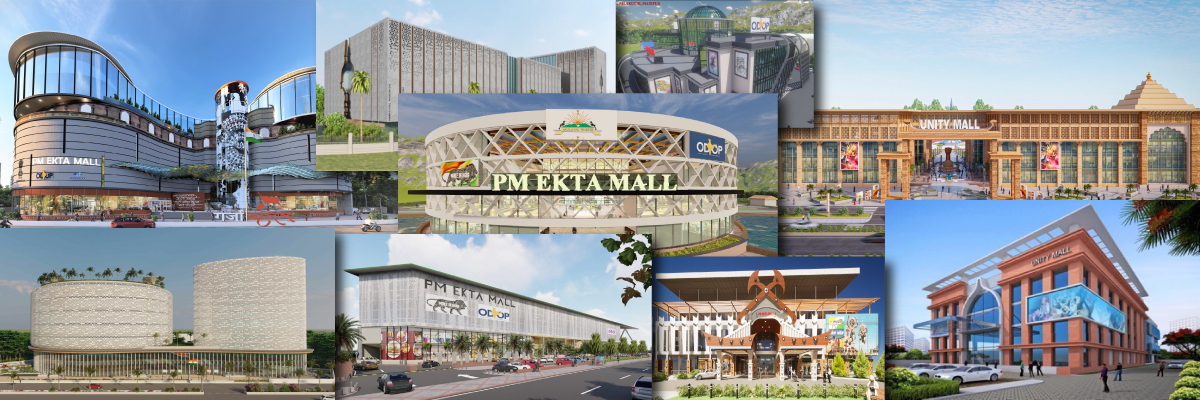In a strategic move to highlight India’s rich heritage, the recent launch of the PM Ekta Malls initiative is set to elevate ODOP and GI products, including local handicrafts and handlooms, to the global stage.
As detailed in the Union Budget 2023-24, these upcoming PM Ekta Malls (PMEMs) are designed to do more than just showcase local crafts.
The Scheme for Special Assistance to States for Capital Investment 2023-24 includes a substantial outlay of ₹5,000 crore in 50-year interest-free loans to states.
These malls are set to become India’s gateways to international markets, with the potential to become major export hubs.
Strategically located in the state capitals and prominent tourist destinations, the PMEMs are well-positioned to serve as export hubs. Their presence will attract international visitors and buyers, opening multiple windows to India’s vast array of artisanal products.
Utilizing PMEMs as action centers and platforms for artisans
The initiative is crucial because, currently, there is a significant lack of dedicated spaces for showcasing each state’s unique handicrafts, handlooms and agricultural products - with only a few exceptions in the National Capital. This absence means that local artisans and producers often struggle to find platforms to display their work, limiting their reach and potential market.
Additionally, many people are unaware of their districts and states' diverse range of One District One Products (ODOP), Geographical Indication (GI) products and various state government initiatives to promote it.
Without sufficient branding and marketing, these unique items fail to gain the recognition they deserve. This is where the PMEMs will bridge this gap by providing a centralized, well-promoted space where local craftsmanship can be celebrated and accessed by both domestic and international buyers. Thereby, boosting the visibility and economic viability of these traditional industries.
Glocalizing artistry
Glocally, these malls are poised to become the platform of the future, serving India’s traditional craftsmanship and domestic products from the ODOP initiative and those with GI tags—to meet local and global demand for unique, high-quality products.
Export hubs, an achievable transition
- Showcasing unique offerings: Each of these PMEM will feature dedicated space from 36 states & UTs with products that are emblematic of their respective states, ranging from intricate handlooms to exquisite handicrafts, highlighting distinctive and authentic products to global buyers. These malls can foster a sense of pride and preserving cultural traditions and enhance the overall tourism experience and increasing tourist spending.
- Streamlining export processes: State-of-the-art facilities, coupled with dedicated commercial spaces, hold the potential to streamline the export process. Here, setting up of export-oriented sections and partnerships with logistics providers can help artisans and producers navigate the complexities of international trade.
- Leveraging technology: The integration of virtual reality and augmented reality within the malls will not only attract visitors to experience products before buying but also enhance customer experience and market expansion.
- Building strategic partnerships: These shopping centers can facilitate connections between local artisans and international buyers through trade fairs, business matchmaking events and collaborative marketing campaigns. By fostering these relationships, the malls will play a crucial role in opening new export channels for Indian products.
- Supporting rural artisans: By providing rural artisans access to global markets, these plazas will help them scale their businesses to international standards by boosting their incomes and promoting sustainable traditional crafts. Artisans can also benefit from training and workshops on modern marketing techniques and business practices. For example, Madhya Pradesh can support its rural artisans by promoting products like Chanderi and Maheshwari sarees, opening new export channels and boosting their incomes along with ensuring the sustainability of traditional crafts.
- Branding and marketing: States can use these malls to enhance the branding and marketing of their ODOP and GI products. For instance, Rajasthan can highlight its Blue Pottery from Jaipur. Similarly, Pashmina shawls will represent Kashmir. These unique products can draw attention to the states' rich artistic heritage, increasing awareness and demand among tourists and collectors.
Learning from global best practices
PM Ekta Malls can draw valuable lessons from similar initiatives in other countries to enhance their effectiveness. For instance:
- Japan’s Michi-no-Eki emphasizes community involvement and diverse offerings, which can inspire PMEMs to engage local communities and offer a wide range of products
- France’s National Interest Markets highlight the importance of direct sales and quality standards, suggesting that PMEMs should facilitate direct artisan-to-consumer sales and maintain high product quality
- Italy’s Mercato Centrale showcases the benefits of central locations and cultural events, encouraging PMEMs to be centrally located and host cultural activities
- US farmers’ markets focus on sustainability and community engagement, which can guide PMEMs to promote sustainable practices and foster a strong sense of community. By integrating these insights, PMEMs can become vibrant hubs that effectively promote local handicrafts, handlooms and agricultural products on a global scale.
Current status and prospects
As of September, significant progress has been made with stone-laying ceremonies in nine states: Bihar, Assam, Tripura, Nagaland, Manipur, Arunachal Pradesh, Gujarat, Maharashtra and Madhya Pradesh.
Kerala, Odisha, Telangana, Jharkhand, Meghalaya, Chhattisgarh, Tamil Nadu, Sikkim, Uttarakhand, Uttar Pradesh, Haryana, Andhra Pradesh, Himachal Pradesh, Goa, Punjab, Karnataka, Rajasthan and Mizoram are next in the pipeline.
Through this initiative, India’s traditional crafts are set to make a significant impact on the world stage, embodying the spirit of ‘Ek Bharat, Shreshtha Bharat’ in every corner of the globe.
- https://www.indiabudget.gov.in/doc/bspeech/bs2023_24.pdf
- https://pib.gov.in/PressReleseDetailm.aspx?PRID=1990377®=3&lang=1
- https://news.abplive.com/elections/pm-narendra-modi-exclusive-interview-abp-news-ekta-malls-statue-of-unity-sardar-vallabhbhai-patel-lok-sabha-election-result-2024-1690947
- https://pib.gov.in/PressReleasePage.aspx?PRID=2062126
- https://www.hindustantimes.com/cities/mumbai-news/modi-lays-foundation-for-unity-mall-in-ulwe-101710270990626.html
- https://www.bignewsnetwork.com/news/274667634/ekta-mall-is-pm-modi-dream-project-tripura-cm-manik-saha
- https://www.indiatodayne.in/assam/story/assam-government-to-construct-rs-226-crore-worth-unity-mall-in-guwahati-677221-2023-09-13


